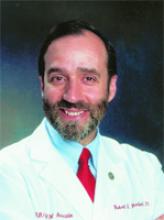Ask any obstetrician to name the most pressing problem of practice today and you will likely get the same quick response: a medical liability system spun out of control.
Perhaps the most perplexing of the many factors that contribute to the medicolegal nightmare comes from within our ranks: the “expert” witness who provides untruthful, inappropriate, and unprofessional testimony.
These “hired guns” have been difficult to control. But now, several organizations are taking action to preserve the integrity of physician testimony.
Rooting out the problem
One professional society, the American Association of Neurological Surgeons (AANS), has a distinguished record of curbing the most egregious instances of untruthful testimony. Over the past 20 years, the AANS has imposed penalties ranging from censure to suspension on about 2 dozen expert witnesses.
Now, the American Medical Association is beginning to regard expert testimony as a type of medical service—one that should be subject to peer review by medical societies as well as state medical boards.
Perhaps most relevant to Ob/Gyns is an important new program by the American College of Obstetricians and Gynecologists (ACOG). Expert witnesses who are Fellows of the College now must pledge to adhere to the principles outlined in ACOG’s “Expert Witness Affirmation.” Physicians who sign this document swear, among other things, that they have relevant expertise and will provide true and impartial testimony based on generally accepted standards.
During litigation, lawyers can use the affirmation to examine expert witnesses and, through questioning, alert the jury when a physician has refused to sign the document. Clinicians who do not agree to the terms of the affirmation will appear less credible than those who do. As a result, today’s hired gun will be of less and less use.
- I will always be truthful.
- I will conduct a thorough, fair, and impartial review of the facts and the medical care provided, not excluding any relevant information.
- I will provide evidence or testify only in matters in which I have relevant clinical experience and knowledge in the areas of medicine that are the subject of the proceeding.
- I will evaluate the medical care provided in light of generally accepted standards, neither condemning performance that falls within generally accepted practice standards nor endorsing or condoning performance that falls below these standards.
- I will evaluate the medical care provided in light of the generally accepted standards that prevailed at the time of the occurrence.
- I will provide evidence or testimony that is complete, objective, scientifically based, and helpful to a just resolution of the proceeding.
- I will make a clear distinction between a departure from accepted practice standards and an untoward outcome.
- I will make every effort to determine whether there is a causal relationship between the alleged substandard practice and the medical outcome.
- I will submit my testimony to peer review, if requested by a organization to which I belong.
- I will not accept compensation contingent upon the outcome of the litigation.
A new hope
The ACOG affirmation is a small but extremely important step toward rescuing obstetrical practice from the troubles of litigation. If professional organizations can ensure that physician witnesses are in fact true experts, that they tell “the truth, the whole truth, and nothing but the truth,” that their testimony is subject to peer review, and that they are sanctioned for unprofessional conduct, we may be well on the road to saving our profession.
Perhaps the most perplexing factor of the medicolegal nightmare comes from within our ranks: the “expert” witness who provides untruthful, inappropriate, and unprofessional testimony.


